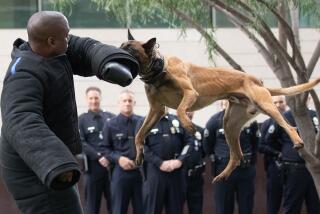Barbie Uses U.S. Army Alias as His Trial Opens
- Share via
LYON, France — Former Gestapo lieutenant Klaus Barbie identified himself at the opening of his trial Monday as Klaus Altmann, the name given to him by the U.S. Army almost 40 years ago to protect him from prosecution.
There were some low whistles, in Europe a sign of derision, from the packed courtroom, and lawyers for the plaintiffs quickly arose to challenge Barbie.
But it was soon clear that Barbie was not trying to hide the fact that he was head of the Gestapo, the Nazi secret police, in Lyon during World War II. Speaking softly in both German and French, he acknowledged that his father’s name was Nikolaus Barbie, that he had used the name Altmann only since 1951 and that it had become his legal name only in 1957, when he was naturalized as a Bolivian citizen.
Name Is a ‘Heavy Burden’
Pierre Truche, the prosecutor, quickly cut short the argument by telling the court: “I understand why carrying the name Barbie is such a heavy burden for him now. But he is not denying that he is the same person who carried the name of Klaus Barbie in 1943 and 1944.”
Barbie, 73, who is expected to speak out in his defense later in the week, listened attentively as a clerk of the court began to read out a long statement of charges and evidence against him. The reading, which may take six hours in all to complete, is expected to be completed today.
Barbie is charged with “crimes against humanity” in ordering the arrest and deportation to Nazi extermination camps of a large number of Jews and resistance fighters from the Lyon area. In one incident, Gestapo agents rounded up 44 Jewish children, most of them orphans whose parents had been killed, and sent them in August, 1944, to their deaths at Auschwitz.
An attempt was made by several private lawyers to add to the charges against Barbie, including one dealing with the arrest of Jean Moulin, the French resistance leader who died in custody. Barbie was condemned to death in 1952 and 1954 after being convicted in absentia on these charges. But French courts have ruled that the statute of limitations has run out both on those charges and the sentences.
Judge Andre Cerdini and two advisory judges rejected the pleas by the lawyers and refused to add any charge against Barbie for which he had been tried earlier.
Barbie had not been seen in public since 1983, when a newly elected Bolivian government ended his haven in La Paz and expelled him to French authorities in French Guiana. There was thus a good deal of curious expectation when he entered the courtroom, the huge grand hallway of the Palace of Justice in Lyon.
A Trace of a Smile
The handcuffed Barbie, showing a trace of a smile, entered wearing a black suit. His hair, almost white, was long and swept back. His high cheekbones and shadowed eyes gave his grayish face a funereal look. A policeman removed the handcuffs, and Barbie looked out through his protective glass screen at the crowd, then looked again as if surprised by the number.
A group of photographers and television cameramen had been allowed in for the opening half-hour, and they crowded within a few feet of him. In response to their signals, Barbie smiled and chatted with his lawyer, Jacques Verges.
Although four interpreters have been assigned to convert the court proceedings into German for Barbie and his German into French for the court, Barbie, who speaks French well, sometimes replied in French rather than in German.
Barbie’s use of the name Altmann underscored the American embarrassment over the case. After the war, the U.S. Army Counter Intelligence Corps harbored Barbie in West Germany and employed him as an agent providing information about German Communists.
When French demands for the man known as “the Butcher of Lyon” became incessant, the Counter Intelligence Corps in 1951 provided Barbie with a false passport under the name of Klaus Altmann and arranged for him to flee to South America. Barbie used that name when he settled in Bolivia and became a Bolivian citizen.
Memorial to Victims
There has been some attempt in France to focus on the educational value of the trial, and a few hours before the trial opened, Jewish organizations dedicated a huge, temporary memorial to the Jewish victims of Nazi Germany. Forty-four Jewish children, representing the children taken away in the raid allegedly ordered by Barbie in 1944, walked through the memorial in the Place des Terreaux near the City Hall in the center of Lyon.
The memorial includes an exhibit of photographs of Nazi atrocities and drawings made by Jewish children in concentration and extermination camps.
More to Read
Sign up for Essential California
The most important California stories and recommendations in your inbox every morning.
You may occasionally receive promotional content from the Los Angeles Times.









